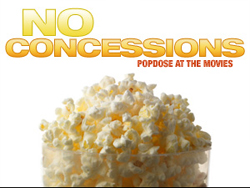 In case you were wondering: Yes, I’m still seeing movies. Yes, I’m still talking about movies.
In case you were wondering: Yes, I’m still seeing movies. Yes, I’m still talking about movies.
But, no, I haven’t been writing much about movies.
Part of the reason is a familiar problem across America, crumbling infrastructure. Flooding took out my office space/home theater/man cave, and communications have been a step up from two cups and a string ever since. Renovations are underway, and the situation has eased.
Part of it is, naggingly, professional. There isn’t that much new or compelling to opine about Captain America: Civil War, X-Men: Apocalypse, or the spasm of summer sequels. In a sense, Hollywood has done its job–these installments hit their marks, make just enough money to justify the effort, and clear the path for the next one. The product lines are ruthlessly efficient. They’re engineered so that you don’t have much to say about them on your way out of the theater. (Except maybe “Next!”)
But we are having our say about them, and the news is mixed for the studios. Correctly sensing a second or third or seventh helping of the same old stuff, audiences have grown resistant, and boxoffice attendance and grosses have been seesawing. Star Trek and Jason Bourne are too old for the heavy lifting they’re required to do. Prisoners get meals with more variety and sustenance than Teenage Mutant Ninja Turtles: Out of the Shadows, Alice Through the Looking Glass, and Now You See Me 2.
So: Not a great summer for movies.
But I can’t return to active-ish duty with bad news. There are good reasons to be optimistic about 2016 at the cinema: 17, in fact. Let’s accentuate the positive.
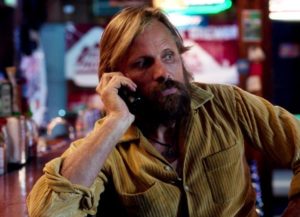 Expanding its theatrical run is Captain Fantastic, which is wholly dependent on a marvelous star turn by Viggo Mortensen, as a learned mountain man dad who has raised his six children in splendid isolation. The idyll comes to an end when their mother dies and civilization (incarnated by Frank Langella’s disapproving father-in-law and well-meaning but hapless public school parents Steve Zahn and Kathryn Hahn) comes knocking. Mortensen, who has a knack for making understatement vivid, pulls the movie through some bumpy stretches. Also still playing in “selected theaters,” as they used to say, two New York stories: the fine documentaries Weiner, about the former most controversial pol’s fall from grace, and even harder fall once he thought he had pulled himself together (“Carlos Danger” texting!), and The Witness, a harrowing story of fact and fiction surrounding murder victim Kitty Genovese, as told by her brother, decades later.
Expanding its theatrical run is Captain Fantastic, which is wholly dependent on a marvelous star turn by Viggo Mortensen, as a learned mountain man dad who has raised his six children in splendid isolation. The idyll comes to an end when their mother dies and civilization (incarnated by Frank Langella’s disapproving father-in-law and well-meaning but hapless public school parents Steve Zahn and Kathryn Hahn) comes knocking. Mortensen, who has a knack for making understatement vivid, pulls the movie through some bumpy stretches. Also still playing in “selected theaters,” as they used to say, two New York stories: the fine documentaries Weiner, about the former most controversial pol’s fall from grace, and even harder fall once he thought he had pulled himself together (“Carlos Danger” texting!), and The Witness, a harrowing story of fact and fiction surrounding murder victim Kitty Genovese, as told by her brother, decades later.
Steven Spielberg’s The BFG: DOA, finished, in soul-deadened multiplexes clotted with the tired and true. Yet based on my kids’ enthusiastic reactions to their first Spielberg (“has he made more movies like this?” they asked) it will have a long life on smaller screens. More’s the pity, as, unsurprisingly, it features extraordinary big screen craft, a quantum leap over the undistinguished CGI that washes over everything from stultifying big-budget continuations like X-Men: Apocalypse to the lower-cost, generously overpraised The Shallows.
At least he’s still making movies. His best friend, Brian De Palma, had plenty of time on his hands to participate in the interview sessions that comprise De Palma, a thoroughly entertaining ramble through his career, his fraught childhood, 70s cinema, and Obsession star Cliff Robertson’s perma-tan. If he’s never going to eke out even an honorary Oscar, we at least have this as a memento of De Palma’s distinctive, controversial career. He says he’s happy scrounging around for international financing to make movies his way, but that, alas, takes years, and his age is precarious. Rather than talk good movies, I’d like to see him make one again.
 This has however been a banner year for Spielberg and De Palma’s contemporary, Terrence Malick. After a twenty-year hiatus Malick’s filmmaking clambered back to life in the late 90s, and his pace has been steadier. The Criterion Collection just released all three cuts of The New World (2005) in a deluxe home video package, and his decades-in-the-making Voyage of Time bows this fall. This may be his best film for this moment in his career, which has seen hin fall away from narrative and embrace the cosmos, the mystic. I appreciated his latest, Knight of Cups, more than his last, To the Wonder, for the grace of its cinematography and physical production than any other quality. The tarot-inflected storyline, involving flailing comedy (comedy!) writer Christian Bale and a string of pretty women in Los Angeles and Las Vegas, wears down both patience and a lot of talent in vague roles. But–gorgeous, and the Blu-ray is an excellent approximation of what captivated my senses in the theater, with a Malick-less bonus of a making-of that gives some of the talent (ranging from toe-sucked Natalie Portman and Nick Offerman) more to do in praise of him than for him. Equally deserving of raves is three-time Oscar-winning DP Emmanuel Lubezki–there’s a twilight shot of an LA parking garage that’s so magnificent that when I saw it I wanted to pause the screening, applaud, and download the image as a screensaver.
This has however been a banner year for Spielberg and De Palma’s contemporary, Terrence Malick. After a twenty-year hiatus Malick’s filmmaking clambered back to life in the late 90s, and his pace has been steadier. The Criterion Collection just released all three cuts of The New World (2005) in a deluxe home video package, and his decades-in-the-making Voyage of Time bows this fall. This may be his best film for this moment in his career, which has seen hin fall away from narrative and embrace the cosmos, the mystic. I appreciated his latest, Knight of Cups, more than his last, To the Wonder, for the grace of its cinematography and physical production than any other quality. The tarot-inflected storyline, involving flailing comedy (comedy!) writer Christian Bale and a string of pretty women in Los Angeles and Las Vegas, wears down both patience and a lot of talent in vague roles. But–gorgeous, and the Blu-ray is an excellent approximation of what captivated my senses in the theater, with a Malick-less bonus of a making-of that gives some of the talent (ranging from toe-sucked Natalie Portman and Nick Offerman) more to do in praise of him than for him. Equally deserving of raves is three-time Oscar-winning DP Emmanuel Lubezki–there’s a twilight shot of an LA parking garage that’s so magnificent that when I saw it I wanted to pause the screening, applaud, and download the image as a screensaver.
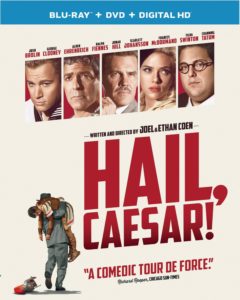 More than midway through the year a number of favorite movies, like the Oscar-nominated pocket epic from Colombia, Embrace of the Serpent, and Hello, My Name is Doris, with Sally Field’s perfectly judged performance, are now available on DVD and Blu-ray. The Coen brothers’ latest, Hail, Caesar! is their slightest movie since Burn After Reading but it’s also raucously funny if it catches you in the right mood. The flip side of Trumbo, it’s a movie of choice bits that pop up every few minutes, like dum-dum movie star George Clooney’s sudden embrace of dialetctical materialism and a classic, minutes-long verbal clash between Ralph Fiennes and the winsome Alden Ehrenreich, who could conceivably go from this into The Buddy Ebsen Story (instead, he’s the young Han Solo). I feel I’m just about alone in my affection for this one, which on Blu-ray is well-represented with a pristine transfer (shot on film, folks) and a few friendly EPK featurettes about the cast and the 50s period design.
More than midway through the year a number of favorite movies, like the Oscar-nominated pocket epic from Colombia, Embrace of the Serpent, and Hello, My Name is Doris, with Sally Field’s perfectly judged performance, are now available on DVD and Blu-ray. The Coen brothers’ latest, Hail, Caesar! is their slightest movie since Burn After Reading but it’s also raucously funny if it catches you in the right mood. The flip side of Trumbo, it’s a movie of choice bits that pop up every few minutes, like dum-dum movie star George Clooney’s sudden embrace of dialetctical materialism and a classic, minutes-long verbal clash between Ralph Fiennes and the winsome Alden Ehrenreich, who could conceivably go from this into The Buddy Ebsen Story (instead, he’s the young Han Solo). I feel I’m just about alone in my affection for this one, which on Blu-ray is well-represented with a pristine transfer (shot on film, folks) and a few friendly EPK featurettes about the cast and the 50s period design.
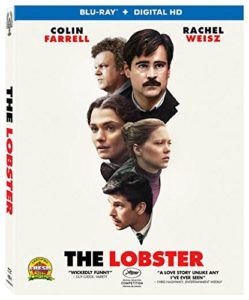 “I loved this, but no one’s going to see it,” I said on my way out of a screening of The Lobster. Boy, is my face lobster-red after that one. Lots of other people got on its peculiar wavelength, too, and a movie I didn’t think would have much of a life outside of festivals has grossed a terrific $10 million. I question whether its home video release is premature as it remains in theaters but here it is, and I’m happy to revisit it. This kind of surreality is difficult to get right without descending into whimsy. The Lobster doesn’t; indeed, there are some real gut-punch moments, not at all cute or playfully weird, in its story of a world where depressed singletons, like Colin Farrell’s overweight schlub, are obliged to find new partners or be turned into animals. He’s content to be a lobster, alone at the bottom of the sea, but rebels led by Rachel Weisz cause him to take a stand. (Overseeing the deranged serial dating that occurs, and the mysterious “transformation room” that the movie walks up to, is Olivia Colman, who, deadpan-perfect, explains that the reason so many dogs pop up on the grounds of the hotel where the process occurs is that most people lack the imagination to pick anything else.) Yorgos Lanthimos, of the Oscar-nominated Greek film The Lobster, has smoothly, and remarkably, transferred his brand of absurdism to the international market, with a non-professional supporting cast merging splendidly with the above-the-line stars, all of whom play the situations with a poker face. (Truly hilarious moments, like the lithe Ben Whishaw getting into a fistfight with portly John C. Reilly, help make the film navigable.) A superb Blu-ray transfer is complemented by a making-of featurette that “explains” the movie; it’s up to you to figure out why it appeals. (It does my heart good to see that so many people did meet it halfway.)
“I loved this, but no one’s going to see it,” I said on my way out of a screening of The Lobster. Boy, is my face lobster-red after that one. Lots of other people got on its peculiar wavelength, too, and a movie I didn’t think would have much of a life outside of festivals has grossed a terrific $10 million. I question whether its home video release is premature as it remains in theaters but here it is, and I’m happy to revisit it. This kind of surreality is difficult to get right without descending into whimsy. The Lobster doesn’t; indeed, there are some real gut-punch moments, not at all cute or playfully weird, in its story of a world where depressed singletons, like Colin Farrell’s overweight schlub, are obliged to find new partners or be turned into animals. He’s content to be a lobster, alone at the bottom of the sea, but rebels led by Rachel Weisz cause him to take a stand. (Overseeing the deranged serial dating that occurs, and the mysterious “transformation room” that the movie walks up to, is Olivia Colman, who, deadpan-perfect, explains that the reason so many dogs pop up on the grounds of the hotel where the process occurs is that most people lack the imagination to pick anything else.) Yorgos Lanthimos, of the Oscar-nominated Greek film The Lobster, has smoothly, and remarkably, transferred his brand of absurdism to the international market, with a non-professional supporting cast merging splendidly with the above-the-line stars, all of whom play the situations with a poker face. (Truly hilarious moments, like the lithe Ben Whishaw getting into a fistfight with portly John C. Reilly, help make the film navigable.) A superb Blu-ray transfer is complemented by a making-of featurette that “explains” the movie; it’s up to you to figure out why it appeals. (It does my heart good to see that so many people did meet it halfway.)
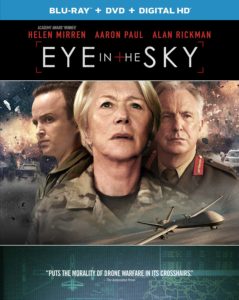 There were a lot of patrons as well for the gripping suspense thriller Eye in the Sky, as older audiences sick of super stuff, animation, and low budget horror movies (I’m not sure why the studios bother making anything else) go indie. As a British colonel monitoring terrorists in Kenya, Helen Mirren is in the driver’s seat making life or death decisions regarding drones; she never physically interacts with the drone pilot in America (Aaron Paul) or the on-the-ground observer (Captain Phillips Oscar nominee Barkhad Abdi) whose mission becomes all the more critical when a little girl unwittingly enters the kill zone. This is a procedural, rather than a critique of our reliance on aerial assassination in the post 9/11 world, and it’s guilty of some far-fetched notions regarding the technology. But the multi-planar presentation is absorrbing, there is some brittle humor (the late Alan Rickman had his last role, as a lieutenant general with unforeseen doll problems), and it is about something, which made it a must for discerning audiences. The Blu-ray is functional, with useless EPK supplements, but, like drones, it gets the job done.
There were a lot of patrons as well for the gripping suspense thriller Eye in the Sky, as older audiences sick of super stuff, animation, and low budget horror movies (I’m not sure why the studios bother making anything else) go indie. As a British colonel monitoring terrorists in Kenya, Helen Mirren is in the driver’s seat making life or death decisions regarding drones; she never physically interacts with the drone pilot in America (Aaron Paul) or the on-the-ground observer (Captain Phillips Oscar nominee Barkhad Abdi) whose mission becomes all the more critical when a little girl unwittingly enters the kill zone. This is a procedural, rather than a critique of our reliance on aerial assassination in the post 9/11 world, and it’s guilty of some far-fetched notions regarding the technology. But the multi-planar presentation is absorrbing, there is some brittle humor (the late Alan Rickman had his last role, as a lieutenant general with unforeseen doll problems), and it is about something, which made it a must for discerning audiences. The Blu-ray is functional, with useless EPK supplements, but, like drones, it gets the job done.
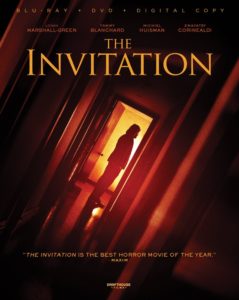 The Invitation marks the bigscreen return of director Karyn Kusama, who made an assured debut with Girlfight (2000) then got lost in the Hollywood shuffle. You’d think the filmmaker behind that and 2005’s Aeon Flux would be given a superhero movie by now, and maybe Marvel or DC will come calling. Maybe, too, that’s kids stuff for her at this stage, as she’s made a terrific psychological thriller/horror movie centered on one spectacularly awful party–awful, anyway, for Will (Logan Marshall-Green), who has agreed to visit his ex-wife (Tammy Blanchard) and her new husband (Michael Huisman) at their old digs, the site of an unspecified tragedy he can’t shake two years later. Tremors of unease start shaking as the other guests prove weird in their own right, most startlingly the inappropriately avid Sadie (Lindsay Burdge) and Pruitt, played by the great character actor John Carroll Lynch. What starts as a halting attempt to reconnect descends quickly into hell, where clever twists and off-kilter performances reside. Making the film more inviting, Kusama and co-writers Phil Hay (her husband) and Matt Manfredi discuss the production and its real-life roots on a commentary track, which is supported by a making-of, a detailed booklet, and a pair of simple, stark music videos. While the Blu-ray transfer’s on the murky side, The Invitation is as hard as nails, and proof that 2016 isn’t as soft as you might think.
The Invitation marks the bigscreen return of director Karyn Kusama, who made an assured debut with Girlfight (2000) then got lost in the Hollywood shuffle. You’d think the filmmaker behind that and 2005’s Aeon Flux would be given a superhero movie by now, and maybe Marvel or DC will come calling. Maybe, too, that’s kids stuff for her at this stage, as she’s made a terrific psychological thriller/horror movie centered on one spectacularly awful party–awful, anyway, for Will (Logan Marshall-Green), who has agreed to visit his ex-wife (Tammy Blanchard) and her new husband (Michael Huisman) at their old digs, the site of an unspecified tragedy he can’t shake two years later. Tremors of unease start shaking as the other guests prove weird in their own right, most startlingly the inappropriately avid Sadie (Lindsay Burdge) and Pruitt, played by the great character actor John Carroll Lynch. What starts as a halting attempt to reconnect descends quickly into hell, where clever twists and off-kilter performances reside. Making the film more inviting, Kusama and co-writers Phil Hay (her husband) and Matt Manfredi discuss the production and its real-life roots on a commentary track, which is supported by a making-of, a detailed booklet, and a pair of simple, stark music videos. While the Blu-ray transfer’s on the murky side, The Invitation is as hard as nails, and proof that 2016 isn’t as soft as you might think.





Comments